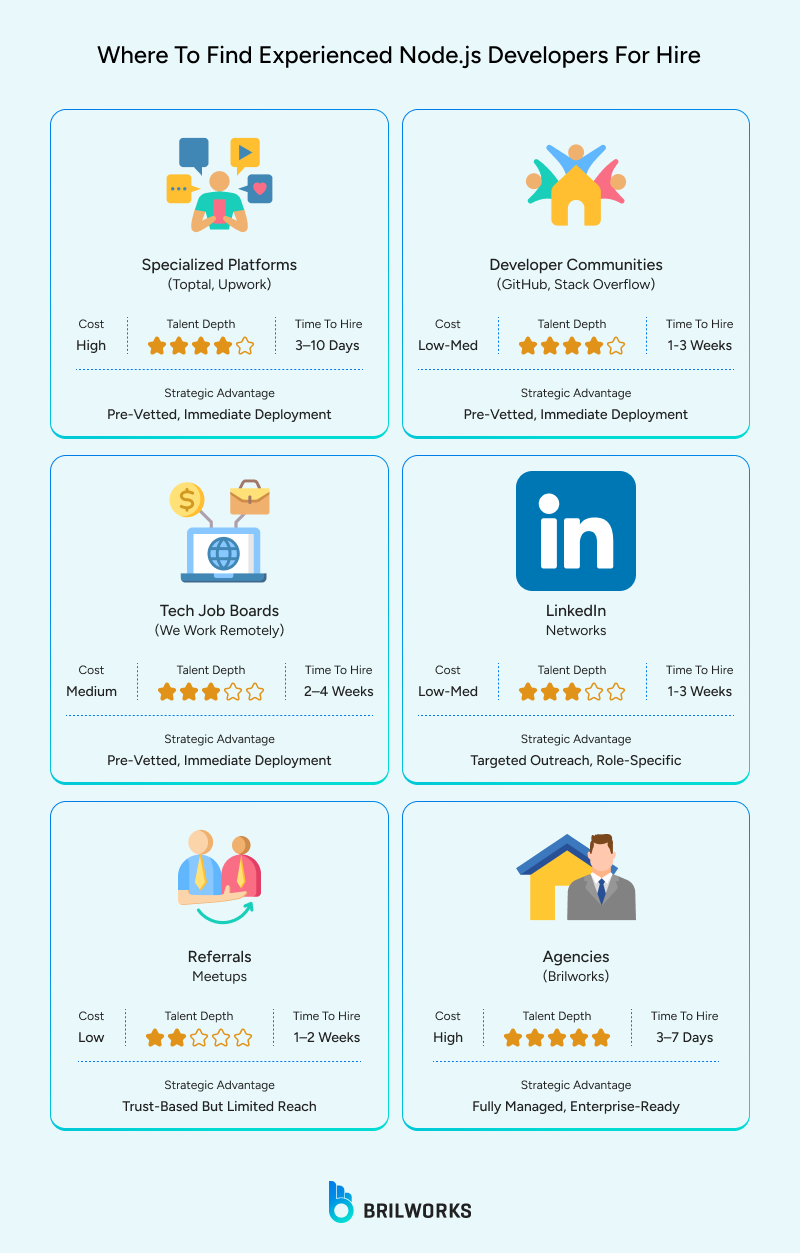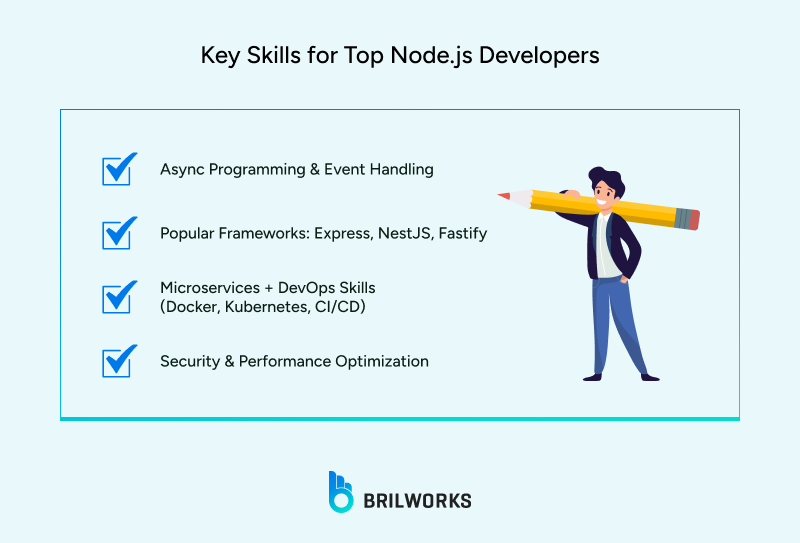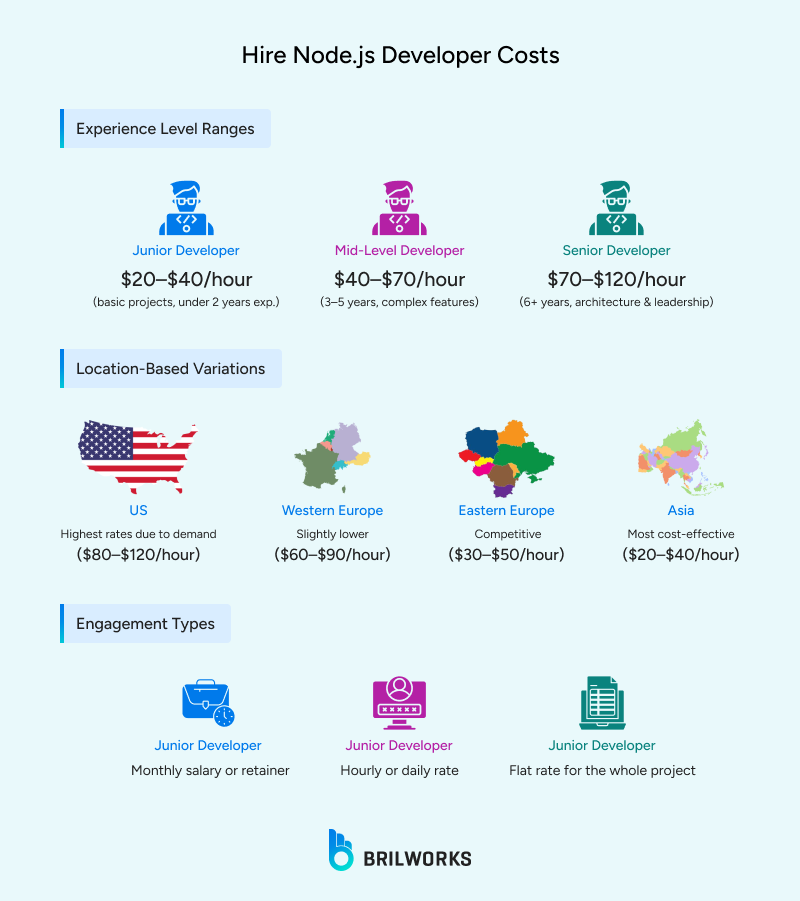COOPERATION MODEL
ARTIFICIAL INTELLIGENCE
PRODUCT ENGINEERING
DevOps & Cloud
LOW-CODE/NO-CODE DEVELOPMENT
INDUSTRY
FRONTEND DEVELOPMENT
CLOUD DEVELOPMENT
MOBILE APP DEVELOPMENT
LOW CODE/ NO CODE DEVELOPMENT
EMERGING TECHNOLOGIES








Indeed, a prominent job, in its report, states "hiring is getting harder for managers." With AI-driven disruption, companies have shifted their focus to finding experts who can work in an AI-driven workflow. According to the same report, 45% of hiring managers say finding skilled applicants is one of their main challenges.
Based on available data, JavaScript remains the technology with the largest number of developers. It may seem contradictory, but hiring for JavaScript-based roles is still not easy.
When hiring experts or outsourcing software development work, businesses can choose from several hiring models for Node.js projects. Ultimately, the choice depends heavily on project needs. For example, if you want backend experts to build a specific service for your web app, the time and material model may fit. If you need developers for a longer period, the dedicated team model often works better. We have already covered these models in detail in the article – Choosing the Right Hiring Model for Node.js Talent.
However, picking the right model is only part of the process. Finding the right developers, with budget constraints, is challenging.
Today, hiring methods and strategies have evolved. Traditional hiring channels are still relevant, but beyond them, you need a multifaceted approach to reduce hiring effort and control costs.
If you are a software development agency and unsure whether to choose in-house or outsourcing, you can read our expert guide on Node.js hiring. In it, we explain the differences between outsourcing, in-house teams, and staff augmentation, and briefly cover cost considerations for businesses looking to hire Node.js experts.
Today, project managers have multiple options to choose from. Specialized platforms provide vetted Node.js experts at a relatively higher cost. Freelancing platforms can be a good source if you are looking for cost-effective options; however, 55% of businesses agree that a lack of freelancer knowledge about the company is a major challenge.
For short projects and limited-duration work, specialized platforms are the go-to choice for many. To find remote developers, platforms such as LinkedIn, Remotely, and tech job boards are go-to options for many, but crowded, therefore, finding right talent among several applicants can be overwhelming.

LinkedIn is most popular hiring channel, with over 1 billion members globally and millions of tech professionals. The platform's filters make it possible to narrow down candidates by skills, years of experience, and location. Many companies prefer it because it allows direct outreach and lets them see a candidate's career history, recommendations, and mutual connections, which speeds up trust-building.
Upwork reports over 18 million registered freelancers, with a significant share in web development and backend technologies like Node.js. These platforms are popular for short-term and low-budget projects. It requires to careful vetting, when you are hiring develoeprs from freelancing websites.
Toptal accepts only the vetted applicants, according to their own data, which makes it a premium option for businesses that want vetted developers with proven track records. The higher rates are often offset by reduced hiring time and the lower risk of mismatched skills.
GitHub hosts over 100 million developers, many of whom actively contribute to open-source projects. Stack Overflow has 15+ million registered users answering real-world programming questions. These communities are valuable because you can review a developer's actual work before contacting them.
We Work Remotely claims over 4.5 million monthly visitors, while Remote OK lists thousands of tech-specific jobs at any time. Both focus on remote-first talent, making them effective for companies building distributed teams.
Agencies offer pre-vetted developers who can integrate into projects immediately, often as part of a larger delivery team. Many companies choose agencies when they want predictable quality and faster onboarding. For example, Brilworks provides access to experienced Node.js developers who have already worked on diverse, production-grade projects.
At Brilworks we have spent years building teams of expert Node.js developers for a range of projects, from simple APIs to enterprise level platforms. During this period we have discovered that charisma is not the only quality that separates top developers; it is their quantity of applied knowledge.

Node.js runs on non-blocking I/O, so fluency in asynchronous programming is a baseline requirement. The developers who excel in our teams treat async patterns as second nature, knowing when to use Promises over callbacks, spotting race conditions early, and explaining exactly how the Event Loop impacts performance under load.
Framework choice isn't just a preference; it shapes how an application grows. In our projects, developers with strong framework skills don't just "know Express" or "have used NestJS", they can design an architecture, integrate middleware cleanly, and keep the codebase maintainable months or years down the line.
Modern deployments rarely happen in isolation. We've seen how much faster delivery becomes when Node.js developers can package services into Docker containers, configure Kubernetes for scaling, and set up CI/CD pipelines that let us release without breaking other services.
When clients hire us, they expect applications that are both safe and fast. Our most trusted Node.js programmers actively bake in security from the first commit, sanitizing inputs, preventing injection attacks, and then fine-tune performance with caching layers, query optimization, and profiling before launch.
Hiring the right Node.js professionals begins with a clear understanding of your project. Begin by describing your project's goals, features, and requirements. That will help you determine whether you need a mid-level developer or senior engineer. It's also important to determine if the role will require new features to be built or existing code to be maintained, as that affects the expertise needed.
Selecting the appropriate hiring channels is important. You have several choices for node js recruitment: job boards, LinkedIn, freelance platforms, talent networks, and staffing agencies. When deciding which channel fits best, consider:
Freelance sites can be useful for quick, low-budget hires while vetted networks or dedicated teams are more helpful for long-term, quality jobs.
Before the interview, screen for core first skills using tests and pre-screening so you can ensure you are good time wise. Core skills could be things like understanding the Node.js event loop, async error handling, or scaling solutions. Appropriate screening questions could include:
Adding a small coding task to identify bugs or optimize a snippet can showcase coding problem-solving skills as well. Following these practices will save you on hiring a node js developer right for you.
An interview should include both technical questions and behavioral questions. A coding exercise is a more realistic way to test a candidate's skills, for example, build a simple REST API with a caching layer and unit tests. A structured scoring method will also allow you to have fair comparisons across candidates.
Effective communication and cultural fit are critical, particularly for remote positions. When you hire node developers, look for people who are transparent communicators, listen and collaborate well, and have a good attitude about feedback. Get a feel for their experience dealing with production problems or explaining technical topics to non-technical teams.
Finally, make sure that you finalize contract terms relevant for your engagement; fixed price, time-and-materials, or dedicated teams. Important things to cover in contracts include:
Open contracts build trust and align expectations, which is how successful partnerships start. Together, thoughtful planning, targeted recruiting, screening, and contracts will help you find Node.js experts who are both technically talented and compatible with your team and goals.
If you are intending to hire Node.js developers or manage a Node.js development team, knowing the cost differences between experience, location, and engagement models is essential for your budget. Rates can vary considerably and as such, we've created a breakdown of common rates to give you a good sense of typical pricing in the market.

When searching for a node js developer for hire, consider that rates vary not just by geography and experience but also by the complexity of your project and the engagement model you choose. Balancing cost with skill level and commitment helps optimize your investment and project outcomes.
Brilworks specializes in hire nodejs developers for diverse business needs, combining Node.js expertise with AWS consulting and product engineering to deliver speed and quality. This model suits companies looking for reliable, end-to-end development partnerships without the complexities of direct hiring.
Finding and hiring skilled Node.js developers is critical for building scalable, high-performance applications. Whether you choose to build an in-house team, engage freelancers, or outsource to an agency, having the right strategy makes all the difference.
Brilworks offers deep expertise in Node.js development, cloud integration, and agile product delivery. Our focus on speed, quality, and partnership ensures you get the right talent and support for your projects. Ready to hire nodejs developer talent that drives results? Contact us today build your next success story together.
Use NDAs, clear work-for-hire agreements, and IP assignment clauses in contracts to ensure ownership rights remain with your company.
Node.js developers specialize in server-side JavaScript, while full-stack developers handle both backend and frontend technologies.
Hiring timelines vary but generally range from 4–8 weeks for experienced developers, depending on the recruitment channel and role complexity.
Developers should work with the current LTS (Long-Term Support) versions while maintaining understanding of legacy code if your project requires it.
Yes, Node.js integrates well with cloud platforms like AWS, enabling scalable, serverless, and event-driven architectures critical for modern applications.
Get In Touch
Contact us for your software development requirements
Get In Touch
Contact us for your software development requirements